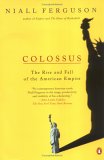Summary | Excerpt | Reviews | Beyond the Book | Readalikes | Genres & Themes | Author Bio

Critics' Opinion:
Readers' Opinion:
First Published:
Apr 2004, 400 pages
Paperback:
Apr 2005, 400 pages
 Book Reviewed by:
Book Reviewed by:
BookBrowse Review Team
Buy This Book
Contents
Introduction
Part I: Rise
Part II: Fall?
Conclusion: Looking Homeward
Statistical Appendix
Acknowledgements
Notes
Bibliography
Index
Introduction
It used to be that only foreigners and those on the political fringes referred to the "American Empire." Invariably, they did so in order to criticize the United States. Since the attack on the World Trade Center in September 2001, however, there has been a growing volume of more mainstream writing on the subject of an American empire. The striking thing is that not all those who now openly use the "e" word do so pejoratively. On the contrary, a number of commentators seem positively to relish the idea of a U.S. imperium.
There is certainly no question that the United States has the military capability to take on the old British role as underwriter of a globalized, liberalized economic system. Before the deployment of troops for the invasion of Iraq, the U.S. military had around 752 military installations located in more than 130 countries, accommodating 247,000 American service personnel deployed abroad. On land, the United States has 9,000 M1 Abrams tanks. The rest of the world has nothing that can compete. At sea, the United States possesses 9 "supercarrier" battle groups. The rest of the world has none. And in the air, the United States has 3 different kinds of undetectable stealth aircraft. The rest of the world has none. The United States is also miles ahead in the production of "smart" missiles and pilotless high-altitude drones. Pentagon insiders call it "full spectrum dominance."
Nor is there any doubt that the United States has the economic resource to maintain FSD. America’s 31 percent share of the world product is equal to the shares of the next four countries combined (Japan, Germany, Britain and France). So rapidly has its economy grown since the late 1980s that it has been able to achieve a unique "revolution in military affairs" while vastly reducing the share of defense expenditures as a proportion of the gross domestic product. According to the Congressional Budget Office, defense spending in 2003 is likely to amount to 3.6 percent of the GDP—substantially below its cold war average. In the space of less than five years, three of the world’s tyrannies—Milosevic’s in Serbia, the Taliban’s in Afghanistan and Saddam Hussein’s in Iraq—have been swept from power at negligible cost. If this combination of military and economic dominance is not imperial power, then it is hard to know what is.
Yet the idea that the United States is now an authentic empire remains entirely foreign to the majority of Americans, who uncritically accept what has long been the official line: that the United States just doesn’t "do" empire. In the words of George W. Bush during the 2000 election campaign: "America has never been an empire. We may be the only great power in history that had the chance, and refused, preferring greatness to power, and justice to glory." Since becoming president, Bush has in fact initiated two invasions of sovereign states, successfully overthrowing their governments in both cases. The Office of the President has produced a document on "National Security Strategy" that states as a goal of U.S. policy "to extend the benefits of freedom…to every corner of the world." But Bush himself has continued to deny that the United States has any imperial intentions. Speaking on board the homeward-bound Abraham Lincoln aircraft carrier on May 1, President Bush declared: "Other nations in history have fought in foreign lands and remained to occupy and exploit. Americans, following a battle, want nothing more than to return home." A few days previously, Donald Rumsfeld was asked by a journalist from Al-Jazeera if the United States was engaged in "empire building in Iraq." "We don’t seek empires," shot back Rumsfeld. "We’re not imperialistic. We never have been." Few Americans would disagree with that sentiment.
From Colossus by Niall Ferguson, Copyright Niall Ferguson 2004. All rights reserved.





The Funeral Cryer by Wenyan Lu
Debut novelist Wenyan Lu brings us this witty yet profound story about one woman's midlife reawakening in contemporary rural China.
Your guide toexceptional books
BookBrowse seeks out and recommends the best in contemporary fiction and nonfiction—books that not only engage and entertain but also deepen our understanding of ourselves and the world around us.